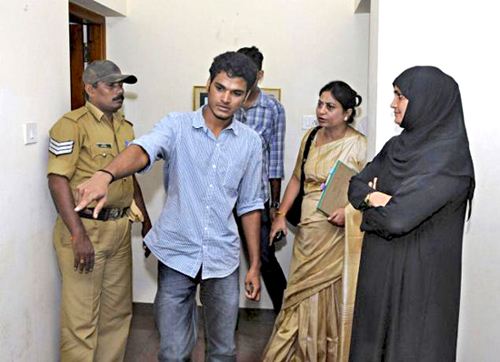
Mangalore, August 18: National Commission of Women (NCW) member Shamina Shafiq has rubbished allegation levelled by State Women's Commission chairperson C Manjula that those partying in Morning Mist homestay in Mangalore had consumed drugs.
She said that it was a birthday party and youth present there did not indulge in any illegal or immoral activities.
Shamina Shafiq, who had arrived at Mangalore on Thursday to conduct an inquiry into the incident, spoke to media before leaving the city on Friday morning. She said that she had spoken to all the persons concerned including the victims of the attack and was quite satisfied with the inquiry.
On the allegations made by the SWC on the consumption of drugs by the party-goers, she said, “As far as what I have read in the newspapers about the SWC Chairperson's statements, they are absolutely wrong.
I don't know from where it (statement) came from or how it came. Neither the police nor anybody else has told me about the presence of drugs in the party. Her (SWC Chairperson) statements are not true. She has not even spoken to the victims or visited them, so how can she make such remarks?” asked the NCW member.
She said that she would mention about the remarks made by the SWC chief in her report to be submitted to the NCW Chairperson. “Each victim except one has deposed before the inquiry committee that they were upset with the SWC report and the chief's remarks.
One of the victim's father has said that he was shocked to see the SWC Chairperson talking bizarre things before the media. I will definitely mention about the SWC report in my report,” said Shamina.
On her interaction with the residents near the homestay, she said the actual residents have not complained against the homestay. They are on record saying that they have never seen anything objectionable happening in the homestay.
However, she brushed aside the memorandum that was submitted to her by a group of women who claimed themselves to be the residents of Padil. The women had complained that the homestay was a place of illegal activities. Shamina said they were not the actual residents. “I asked for their door numbers and they did not know it. Now, you can make out what it is,” she quipped.
Stating that she has received the Action Taken Report (ART) from the Police Commissioner on Thursday evening, she said there are a few points which are actually need to be brought into account and dealt properly. “I will give the recommendation and observations about whatever is lacking in the police investigation in my report which will be submitted to the NCW Chairperson at the earliest.”
She also requested the television channels not to use the video footages while telecasting programme on the incident. “I personally appeal to the media persons kindly not to show the clippings again. The victims and their parents are traumatised.
Whenever you talk of the incident, you show the clippings that too only of the girls, why? There are other ways of showing the act,” she said.
The team that conducted the inquiry included Shamina Shafiq, former MP B Ibrahim, social activist Harini and Ratnaprabha.





Comments
Add new comment